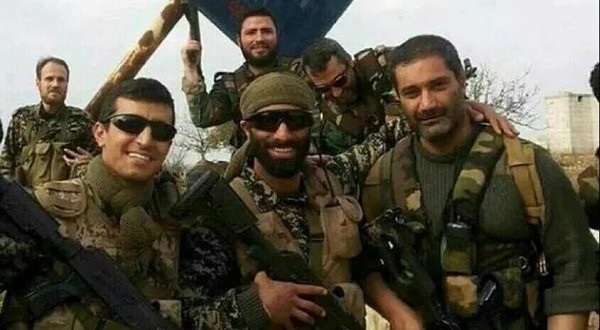Rouhani to Macron: No departure of Iranian military “advisors”
LATEST
- UK Renews Effort for Inspectors to Assign Blame for Chemical Attacks
- OPCW: Sarin Was Used in March 2017 Attack in Hama Province
- “Educationally Damaged”: Pro-Assad Bombing of Schools in Idlib Province
Iran has drawn a line against withdrawal of its military personnel from Syria, pushing back on Israeli demands.
President Hassan Rouhani issued the statement on Tuesday in a one-hour phone call with French President Emmanuel Macron. He said that the presence of Iranian “advisors” — Tehran’s label for any member of its military in Syria — stemmed from a request from the Assad regime to fight terrorism.
Rouhani contrasted this with the presence of forces from other countries — without naming France, the US, Turkey, and the UK — who were in Syria “without any coordination with the Syrian government”.
The Iranian President made no apparent reference to Israel’s insistence that Iranian personnel, Iranian-supported foreign militia, and Hezbollah remain outside a zone in southern Syria, near the Israeli-occupied Golan Heights and the Jordanian border.
After the reoccupation of East Ghouta near Damascus in April, the Assad regime signalled that it would now try to take the opposition territory in Quneitra and Dara’a Provinces. Israel responded not only with warnings but with talks with Assad’s key ally Russia, who said that all “non-Syrian forces” must be out of the area and who promoted a political process for the withdrawal of rebels.
Israeli Prime Minister Benjamin Netanyahu has gone farther, demanding that Iranian personnel leave Syria entirely. Israel has backed up its statements with periodic airstrikes on regime and Iranian positions, with the largest raids across the country in mid-April killing Iranian as well as regime troops.
Neither Rouhani’s office nor Iran’s English-language media mention any response by Macron to Rouhani’s comments on Syria.
UK Renews Effort for Inspectors to Assign Blame for Chemical Attacks
The UK is renewing efforts for international inspectors to be able to assign blame for chemical attacks in Syria.
Foreign Minister Boris Johnson announced on Twitter the attempt to re-establish authority for the Organization for the Prohibition of Chemical Weapons.
UK has tabled draft decision aimed at strengthening the ban on chemical weapons. We propose the @OPCW begins attributing responsibility for chemical weapons attacks in Syria. We also want action to support states to address the chemical terrorism threat.
— Boris Johnson (@BorisJohnson) June 13, 2018
In 2015 the UN Security Council gave the OPCW authority, through a Joint Investigative Mechanism, to assign responsibility. The JIM subsequently found the Assad regime culpable for three chlorine assaults and the ISIS for the use of mustard agent.
However, after the JIM found that the Assad regime carried out the sarin attack on Khan Sheikhoun in northwest Syria in April 2017 — killing about 90 people and wounding hundreds — Russia vetoed the extension of its mandate by the Security Council.
Moscow has continued to block any renewal of the mandate, as it tried to prevent attribution of blame for the Assad regime’s April 2018 chemical attacks on Douma near Damascus.
OPCW: Sarin Was Used in March 2017 Attack in Hama Province
An OPCW report concludes the use of sarin nerve agent was “very likely” on Latamineh in northern Hama Province on March 24 and 25, less than two weeks before the deadly assault on Khan Sheikhoun.
The report also says chlorine was “very likely” used in the attacks over the two days. Witnesses estimated up to 30 casualties from the March 24 attack, including two families sleeping in caves and several men on farmland outside the city. The March 25 attack on Lataminah hospital caused 33 casualties, including 15 staff. Dr Ali Darwish, who was operating at the time, died on the way to treatment at another hospital.
While the inspectors cannot assign responsibility, the report points to the Assad regime with testimony from witnesses that the chemical munitions were dropped by aircraft. Environmental samples contained hexamine and HFP both of which have been indicators of the Assad regime’s sarin production and use.
Inspectors interviewed health workers, first responders, victims, and other residents. The findings from the testimonies and samples were supported by “subsequent cross-reference and corroboration of the evidence”.
“Educationally Damaged”: Pro-Assad Bombing of Schools in Idlib Province
The Education Directorate in Idlib Province has declared Binnish “educationally damaged”, after pro-Assad bombing damaged four of the 12 schools in the town since Monday.
The head of the Binnish council, Mustafa Haj Qaddour, appealed to all institutions to try and accommodate the 800 students affected by the closure of the schools.
Russian and regime forces have escalated the bombing of opposition-held Idlib since last Thursday, beginning with the mass killing of 50 people in the town of Zardana. Rebel attacks on the regime enclaves of al-Fu’ah and Kafraya, in retaliation for Zardana, have brought further pro-Assad airstrikes.
See Syria Daily, June 11: Deadly Pro-Assad Airstrikes on Idlib — UN Calls for Investigation
Syria Daily, June 8: Pro-Assad Strikes Kill 47 in Idlib Province


Just another example of Russia showing it’s duplicitous nature. As well as its prevention of find facts.